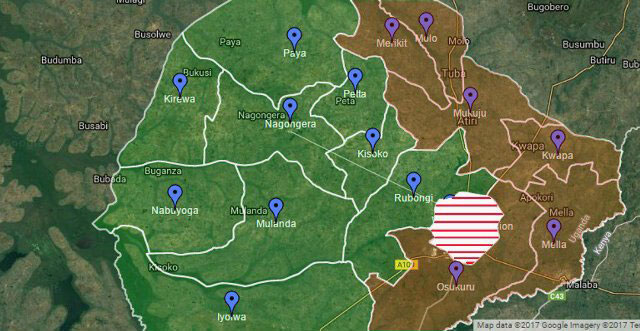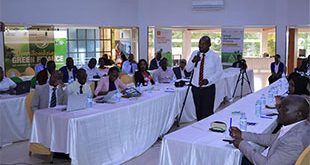
Kampala, Uganda | J OLOKA-ONYANGO | Recent newspaper reports about the issue of Tororo state that President Yoweri Museveni has directed that the matter be resolved using the “colonial boundaries” in order to determine where the municipality should be located in the event of a split of the district. Such a decision is historically misplaced, supports ethnic cleansing, and runs against established practice and precedent that has been in place since the adoption of the 1995 Constitution.
Indeed, it is of considerable surprise that a so-called pan-Africanist such as President Museveni can support what in effect is a decision based on primordial ethnic arithmetic. Furthermore, it demonstrates a blatant disregard of a constitutional order that was put in place by the NRM government itself.
There are several dimensions to the issue of Tororo, but at least two of them stand out, viz., the constitutional and the socio-demographic. Since the enactment of the 1995 Constitution when there were only 39 districts, a total of 78 new ones have come into existence.
Where a new district has been created, the towns/municipalities have remained the headquarters of the old “mother” district. All the new districts have established new headquarters. This has created a precedent followed without exception. The issue of “colonial boundaries” did not arise; indeed, to go back to 1962 is not only neo-colonial, it also assumes that there has been no change in the demographics since independence 55 years ago.
Going back to the colonial order also ignores all of the relevant provisions in our current Constitution, including Article 1 (on the power of the people), Article 3 (on defence of the Constitution), Article 20 (on fundamental rights), Articles 21 (on equality and freedom from discrimination), Article 36 (on the protection of minorities), Article 37 (on the right to culture) as well as the whole of Chapter 11 (on local government). It also violates the provisions of the Local Government Act.
The demand to split the district has several social, demographic and political dimensions. Tororo has always been a multi-ethnic community, and will remain so even after the split. For three centuries, the Jopadhola in Tororo have lived side-by-side with the Iteso, Banyole, Basamia and Bagwere, and more recently with Bagisu, Baganda, Somali and Indians. For the sake of argument, if we are to follow the logic of those who want to split the district based on ethnic majoritarian grounds, it would follow that Tororo Municipality, which is majority “Japs”, would belong to West Budama County. And yet those in support of the split are claiming the municipality.
Going back to the colonial order also ignores all of the relevant provisions in our current Constitution, including Article 1 (on the power of the people), Article 3 (on defence of the Constitution), Article 20 (on fundamental rights), Articles 21 (on equality and freedom from discrimination), Article 36 (on the protection of minorities), Article 37 (on the right to culture) as well as the whole of Chapter 11 (on local government). It also violates the provisions of the Local Government Act.
Unfortunately, this debate has completely side-stepped the position of Tororo Municipality and been dominated by the views from Tororo County. What do the leaders and the people of Tororo Municipality have to say? Ignoring them means that the basic principles of consultation and participation outlined in the 1995 Constitution on the issue of the creation of new districts have been overlooked.
But there is an even larger problem presented by the split, which is the creation of endless enmity between two communities that have peacefully lived together for centuries. A split in the district will not resolve, but simply reproduce the same problems that carving up the district is supposed to resolve because the minorities in the newly created district will air the same grievances. The President’s suggested solution for resolving the issue acutely underscores the problem that the politically-instigated craze of “districtisation” has produced. One can also see how a similar problem can be duplicated in many other regions of the country, as it can be extended beyond tribes to even clans. Does the NRM want to have as its main legacy the ethnic balkanisation of the country?
Finally, this letter is really an appeal to the good sense of every citizen of Tororo specifically and Uganda in general to emerge from this narrow, sectarian and selfishly-motivated politicking. Has the creation of 78 new districts since 1995 really improved service-delivery at the local government level?
**** Dr Oloka-Onyango is a lecturer at Makerere University.
oloka@law.mak.ac.ug
 The Independent Uganda: You get the Truth we Pay the Price
The Independent Uganda: You get the Truth we Pay the Price




We are tired with this people its enough let them go and begin
Dear Dr. Oloka Onyango
Thank you for the eloquent article and the points you brought out clearly concerning the current state of affairs in Tororo.
I couldn’t agree more that social and demographic considerations have to be at the forefront of any decisions made.
Like you mentioned, the multi ethnic heritage of Tororo district makes the situation unique to other districts. In my family alone, the issue cannot be discussed freely as almost every ethnicity in Tororo is represented through the association of marriage. Unfortunately the majority tribes have turned this into an ethnic duel and the lines have been drawn in preparation for a battle that will have no victors. I believe it is this egotistical need for dominance that has for so long fostered disunity and left the district wallowing in slow progress as the rest of the world moves on.
Tororo with its strategic location close to the Kenyan border would and should be a thriving trade hub. Social amenities like water are still viewed as privileges for the lucky few. Every time I drive through the main street on my way to the village my heart sinks at the familiarity of things that have not changed for the last four decades of my life.
I admire the zealous attitude of the young Tororo natives as displayed on social media. Pledges to fight for our district cross back and forth in the different discussions going on. But zeal without knowledge is of little benefit. The attention we seek from the Central government should be for Equity in resource and service distribution.
Again as long as we choose to fight in tribal uniform, there will be no victors.
Kind Regards
Dr.Stella Anne Oloo
MBCHB (MUK) MMED (HUST)
I think you are right ,we are fighting for equal distribution of services not as many may think. When you look at the issue of dividing Tororo in to two, its mainly to bring services to those people who live in Tororo . For u can its like a mudama feels good when the Itesots are missing services and even so of their tribe mates. Some areas in tororo are distant that to an extent if one wants to reach tororo to attend medical services, like someone in paya to reach town has to spend if less then its 10000 to reach town . why not to accept the division in which the badamas control their own affairs in Nagongera and leave Itesots alone also to run their affairs. I a gree with the I dear of division of tororo district for the good of people living it no matter the tribe on belongs
You r calling for war itesots. You have many districts. And u also want tororo? We shall do worse than what the baganda’s did back in 2010 #TororoIsForJopadhola
Hallo to all concerned citizens of Uganda towards development goals however, on the issue of tororo district (split) as its was clearly stated in oloka’s articles, in the split of another district, the municipality remains to the mother district which has been long time practiced till today where we have more than 60 districts plus in uganda, if this division is based on the colonial boundary which the itesots were quick to claim for during the colonial times(securing their identity) in the future, yet history can never be changed if its to consider the genesis of the municipality before colonial errors, then the itesots should accept to be given a district headquarters @ mykujju as per the earlier prosal leaving the municipality as an independent town or else belonging to budama part.
The issue of resolving tororo matters basing on the colonial map, it’s the biggest ERROR